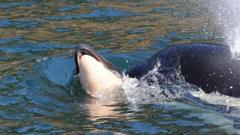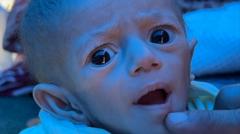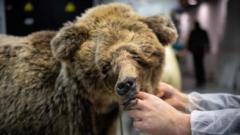A heartbreaking scene has emerged as Tahlequah, a Southern Resident killer whale, is once again seen pushing the deceased body of her newborn calf, reigniting memories of her poignant 2018 journey. Known for her instinctive display of grief, Tahlequah previously captured worldwide attention when she carried her dead calf for 17 days off the coast of British Columbia. This latest sighting took place near Seattle, raising fresh concerns among researchers at the Center for Whale Research, who are dedicated to the conservation of these endangered whales.
This unfortunate event marks a devastating loss for Tahlequah, who has now lost two out of her four recorded calves, both of whom were female. The death of any calf is considered a significant setback for the species, particularly given the alarming decline in the population of Southern Resident killer whales. These majestic marine mammals rely heavily on Chinook salmon for their diet, but this vital food source has been rapidly diminishing in recent years.
The repercussions of these dietary shortages are profound, as studies conducted by the University of Washington reveal a direct correlation between nutrition deficiencies and failure to reproduce among these whales. With the population already classified as endangered in both Canada and the United States, the plight of Tahlequah serves as a poignant reminder of the urgent need for conservation efforts aimed at protecting both the killer whales and their essential salmon habitat.
As Tahlequah mourns, the scientific community and wildlife enthusiasts alike are left to grapple with the stark realities facing these incredible creatures and the environmental issues that continue to threaten their existence.






















